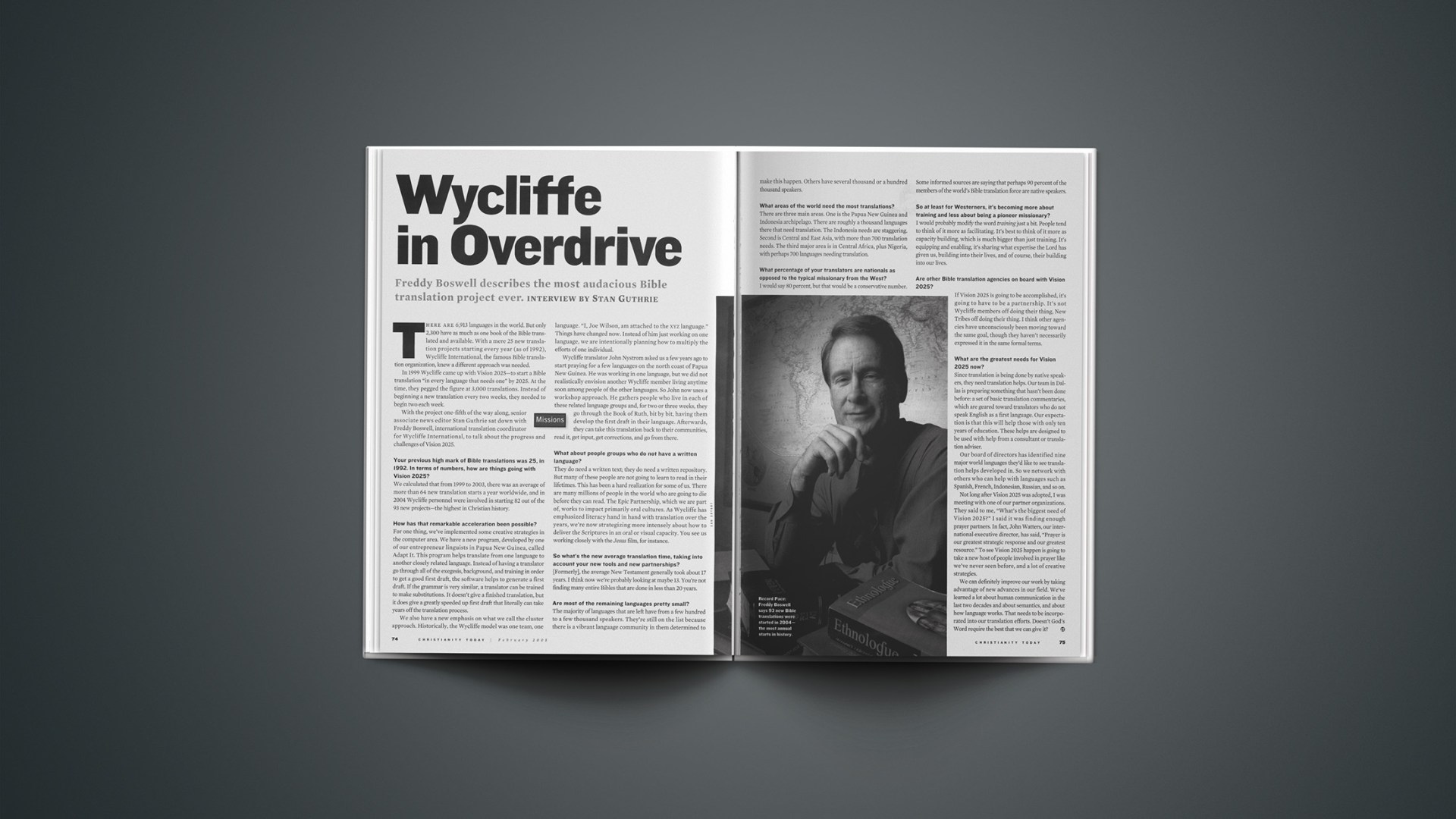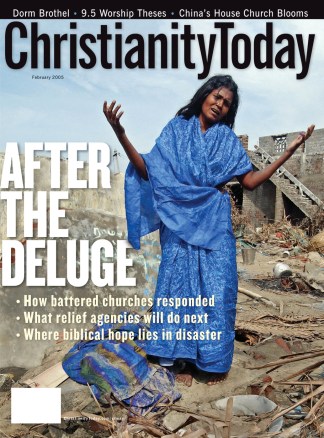There are 6,913 languages in the world. But only 2,300 have as much as one book of the Bible translated and available. With a mere 25 new translation projects starting every year (as of 1992), Wycliffe International, the famous Bible translation organization, knew a different approach was needed.
In 1999 Wycliffe came up with Vision 2025—to start a Bible translation "in every language that needs one" by 2025. At the time, they pegged the figure at 3,000 translations. Instead of beginning a new translation every two weeks, they needed to begin two each week.
With the project one-fifth of the way along, senior associate news editor Stan Guthrie sat down with Freddy Boswell, international translation coordinator for Wycliffe International, to talk about the progress and challenges of Vision 2025.
Your previous high mark of Bible translations was 25, in 1992. In terms of numbers, how are things going with Vision 2025?
We calculated that from 1999 to 2003, there was an average of more than 64 new translation starts a year worldwide, and in 2004 Wycliffe personnel were involved in starting 82 out of the 93 new projects—the highest in Christian history.
How has that remarkable acceleration been possible?
For one thing, we've implemented some creative strategies in the computer area. We have a new program, developed by one of our entrepreneur linguists in Papua New Guinea, called Adapt It. This program helps translate from one language to another closely related language. Instead of having a translator go through all of the exegesis, background, and training in order to get a good first draft, the software helps to generate a first draft. If the grammar is very similar, a translator can be trained to make substitutions. It doesn't give a finished translation, but it does give a greatly speeded up first draft that literally can take years off the translation process.
We also have a new emphasis on what we call the cluster approach. Historically, the Wycliffe model was one team, one language. "I, Joe Wilson, am attached to the xyz language." Things have changed now. Instead of him just working on one language, we are intentionally planning how to multiply the efforts of one individual.
Wycliffe translator John Nystrom asked us a few years ago to start praying for a few languages on the north coast of Papua New Guinea. He was working in one language, but we did not realistically envision another Wycliffe member living anytime soon among people of the other languages. So John now uses a workshop approach. He gathers people who live in each of these related language groups and, for two or three weeks, they go through the Book of Ruth, bit by bit, having them develop the first draft in their language. Afterwards, they can take this translation back to their communities, read it, get input, get corrections, and go from there.
What about people groups who do not have a written language?
They do need a written text; they do need a written repository. But many of these people are not going to learn to read in their lifetimes. This has been a hard realization for some of us. There are many millions of people in the world who are going to die before they can read. The Epic Partnership, which we are part of, works to impact primarily oral cultures. As Wycliffe has emphasized literacy hand in hand with translation over the years, we're now strategizing more intensely about how to deliver the Scriptures in an oral or visual capacity. You see us working closely with the Jesus film, for instance.
So what's the new average translation time, taking into account your new tools and new partnerships?
[Formerly], the average New Testament generally took about 17 years. I think now we're probably looking at maybe 13. You're not finding many entire Bibles that are done in less than 20 years.
Are most of the remaining languages pretty small?
The majority of languages that are left have from a few hundred to a few thousand speakers. They're still on the list because there is a vibrant language community in them determined to make this happen. Others have several thousand or a hundred thousand speakers.
What areas of the world need the most translations?
There are three main areas. One is the Papua New Guinea and Indonesia archipelago. There are roughly a thousand languages there that need translation. The Indonesia needs are staggering. Second is Central and East Asia, with more than 700 translation needs. The third major area is in Central Africa, plus Nigeria, with perhaps 700 languages needing translation.
What percentage of your translators are nationals as opposed to the typical missionary from the West?
I would say 80 percent, but that would be a conservative number. Some informed sources are saying that perhaps 90 percent of the members of the world's Bible translation force are native speakers.
So at least for Westerners, it's becoming more about training and less about being a pioneer missionary?
I would probably modify the word training just a bit. People tend to think of it more as facilitating. It's best to think of it more as capacity building, which is much bigger than just training. It's equipping and enabling, it's sharing what expertise the Lord has given us, building into their lives, and of course, their building into our lives.
Are other Bible translation agencies on board with Vision 2025?
If Vision 2025 is going to be accomplished, it's going to have to be a partnership. It's not Wycliffe members off doing their thing, New Tribes off doing their thing. I think other agencies have unconsciously been moving toward the same goal, though they haven't necessarily expressed it in the same formal terms.
What are the greatest needs for Vision 2025 now?
Since translation is being done by native speakers, they need translation helps. Our team in Dallas is preparing something that hasn't been done before: a set of basic translation commentaries, which are geared toward translators who do not speak English as a first language. Our expectation is that this will help those with only ten years of education. These helps are designed to be used with help from a consultant or translation adviser.
Our board of directors has identified nine major world languages they'd like to see translation helps developed in. So we network with others who can help with languages such as Spanish, French, Indonesian, Russian, and so on.
Not long after Vision 2025 was adopted, I was meeting with one of our partner organizations. They said to me, "What's the biggest need of Vision 2025?" I said it was finding enough prayer partners. In fact, John Watters, our international executive director, has said, "Prayer is our greatest strategic response and our greatest resource." To see Vision 2025 happen is going to take a new host of people involved in prayer like we've never seen before, and a lot of creative strategies.
We can definitely improve our work by taking advantage of new advances in our field. We've learned a lot about human communication in the last two decades and about semantics, and about how language works. That needs to be incorporated into our translation efforts. Doesn't God's Word require the best that we can give it?
Copyright © 2005 Christianity Today. Click for reprint information.
Related Elsewhere:
More about Wycliffe's work, including a daily prayer request, is available from their website.
More Christianity Today articles on Wycliffe and Bible translation includes:
God's Own Dictionary | You won't believe the words that didn't exist until the first English translations of the Bible. (Feb. 05, 2003)
A Translation Fit For A King | In the beginning, the King James Version was an attempt to thwart liberty. In the end, it promoted liberty. (Oct. 22, 2001)
Not Your Grandfather's Mission Field | From lighter radios to lightning-fast computers, technology is speeding up ministry and easing the load at Wycliffe Bible Translators. (Feb. 19, 2001)
Meaning-full Translations | The world's most influential Bible translator, Eugene Nida, is weary of 'word worship.' (Sept. 16, 2002)
New Bible translations help to preserve world's disappearing languages | The total number of languages in which the Bible is available in part or in its entirety now stands at 2233. But this is still barely more than one third of the estimated 6500 living languages in the world. (Feb. 28, 2000)
And the Word Was … Debatable | All those who take up the daunting task of Bible translation step into a force field of tension. (May 18, 1998)
'Your Sins Shall Be White as Yucca' (Part 1 of 3) | Wycliffe missionaries Gene and Marie Scott gave nearly 40 years of their lives translating the New Testament for a small tribe in the jungles of Peru. Was it worth it? (Oct. 27, 1997)
Confessions of a Bible Translator | In this article, Daniel Taylor, and English professor at Bethel College in Minnesota, gives us a glimpse into that most daring of undertakings—humans translating God's Word. (Oct. 27, 1997)
More Bible articles are available on our website.










